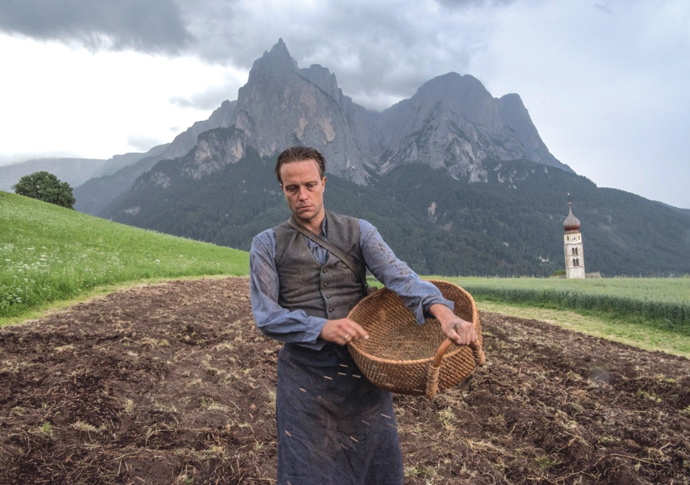
August Diehl in A Hidden Life
A Hidden Life
Directed by Terrence Malick
Certificate 12a
☆☆☆☆
COULD you take up arms to kill a fellow human being, for a cause you know is evil, if someone was holding a gun to your head?
This question is at the heart of Terrence Malick’s A Hidden Life,a wartime drama based on a true story, and is illustrative of many people’s experiences.
We meet Franz Jägerstätter (August Diehl) as he tills the soil in a picture-perfect Austrian mountain village with his wife Fani (Valerie Pachner). Their three delightful children scamper about while we are treated to soft focus-style scenes of this impossibly gorgeous pair frolicking in long grass and generally absorbed in each other’s deliciousness.
It is 1939. What could possibly go wrong?
Called up for service in the Austrian army – by now having been consumed by Hitler’s Germany – Franz is sent to a training centre and told to shove a bayonet in a dummy. This bloodthirsty training is the polar opposite of the daily nurturing this farmer does, the tending to his animals, the planting and watering and harvesting. So much so his stomach turns at the thought. Added to this, he is told he must make a personal vow of loyalty to Hitler. For him, this is a step too far.
Unconsciously pious in his religious devotion to both the soil that feeds him and the God represented in the delicate frescoes of the small chapel he and other villagers gather in, he sees the ludicrousness of saying he would devote himself to a fellow man, let alone one who holds views repugnant to his core beliefs.
After the German victory in France, he is sent back home to continue his life, the war seemingly a long way away.
Then, in 1942, as the German advance to Russia is checked, he receives his call-up papers – and his options for avoiding soldiery diminish.
But when he joins other draftees, he decides he can take a stand, refuse to bear arms, and face the consequences.
You know what to expect when you see a Malick film – and there can be a sense of weariness about his too-clever-by-half, left-field approach to storytelling. It means this film, while incredibly moving and with a vitally important message about morality and personal responsibility, also would have worked well in the hands of a straight-up storyteller. Voiceovers, odd camera angles, a discordant soundtrack give it the art house treatment.
Malick’s wish to hammer home a rural pastoral atmosphere to counter the brutal machine age of the Nazi regime at first is enjoyable.
You’ll be wanting an Alpine holiday.
But it becomes overcooked. Scenes of glorious Austrian countryside and horny-handed peasant folk bringing in the harvest set to an orchestral accompaniment works for a time – but the two love birds fooling around could create a misery guts in the most love-soaked viewer.